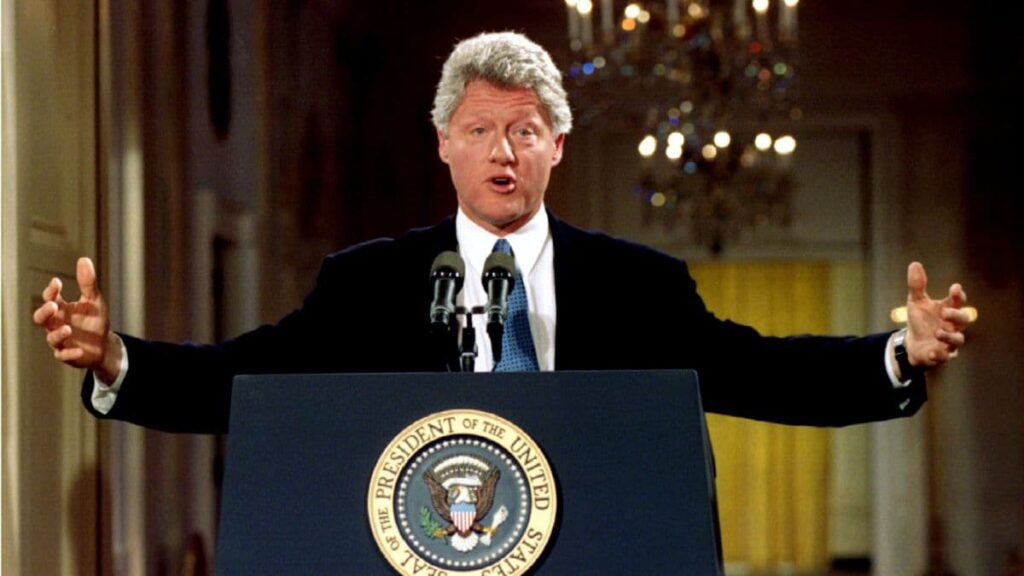Editor’s Note: This profile is
part of a series taking a closer look at US presidents ahead of the 2024 presidential election between Donald Trump and Kamala Harris.
William Jefferson Clinton, the 42nd President of the United States was born on August 19, 1946, in Hope, Arkansas. Raised in a working-class family, Clinton was marked by ambition early in life, famously shaking hands with US President John F Kennedy as a teen during a trip to Washington, DC.
His education path took him through Georgetown University, where he graduated in 1968, to Oxford University as a Rhodes Scholar, and finally to Yale Law School, where he met Hillary Rodham, his future wife and political partner.
Clinton began his political career as Arkansas Attorney General in 1976, and just two years later, at age 32, he became one of the youngest governors in the nation’s history. After losing his re-election bid in 1980, he staged a comeback in 1982 and served as governor of Arkansas for another decade.
Clinton’s rise to power
In 1992, Clinton ran for the presidency, portraying himself as a “New Democrat” who could combine liberal social policies with moderate economic approaches. Despite facing allegations of marital infidelity and questions about avoiding the Vietnam draft, his campaign gained momentum.
With a platform centered on economic recovery, healthcare reform, and balancing the budget, Clinton emerged victorious in a three-way race against incumbent US President George HW Bush and independent candidate Ross Perot.
Clinton’s victory made him the first Democratic president in 12 years. At 46, he became the third-youngest president in US history.
A ‘successful’ first term
Clinton’s first term was a period of both promise and difficulty. His administration passed key legislation like the Family and Medical Leave Act and the North American Free Trade Agreement (NAFTA).
US President Bill Clinton, seen through a window behind his desk in the Oval Office, works the telephones lobbying for last-minute votes to support the North American Free Trade Agreement (NAFTA), November 17, 1993. File Image/Reuters
However, his ambitious push for healthcare reform, led by US First Lady Hillary Clinton, ended in failure after it faced opposition from both Republicans and Democrats.
By 1994, Clinton’s political fortunes took a sharp hit when Republicans, under Newt Gingrich’s “Contract with America” campaign, took control of Congress for the first time in four decades.
This forced Clinton to recalibrate his administration, embracing a more centrist approach known as “triangulation,” which helped him recover politically.
A “scandalous” second term
In 1996, Clinton won a second term, defeating Republican Bob Dole in a landslide. His second term saw major achievements, including welfare reform, a balanced federal budget, and a booming economy during the late 1990s tech bubble.
However, Clinton’s second term is most remembered for the scandal involving White House intern Monica Lewinsky. Clinton initially denied any improper relationship with Lewinsky, but in 1998, he admitted to the affair after further investigation.
US President Bill Clinton on his first trip as President of the United States aboard Airforce One, February 11, 1993. File Image/Reuters
The scandal led to his impeachment by the House of Representatives on charges of perjury and obstruction of justice.
Clinton was acquitted by the Senate in 1999, allowing him to complete his second term. Despite the scandal, his approval ratings remained high, buoyed by the strong economy, and he left office with high public support.
Post-presidency Clinton
After leaving the White House in 2001, Clinton remained a prominent figure in American and global politics. He established the Clinton Foundation, which focused on global issues such as public health, education, and climate change.
His post-presidency saw him serving as a UN envoy and working closely with former US President George HW Bush on disaster relief efforts.
Clinton also played a significant role in the political career of his wife, Hillary, who served as US Senator from New York and US Secretary of State before running for president in 2016. Bill Clinton was a key campaigner during her run.
Clinton’s legacy
Bill Clinton’s presidency is often remembered as one of contradictions. On one hand, he presided over a period of economic growth, job creation, and budget surpluses. His presidency is credited with modernising the Democratic Party and ushering in an era of pragmatic governance.
On the other hand, his personal scandals, particularly the Lewinsky affair, left a cloud over his legacy, marking him as one of only three presidents to be impeached.
Clinton’s political skill, charisma, and ability to connect with voters remain his enduring traits. He is often remembered as a brilliant communicator who could pivot from setback to success with ease. But his presidency’s controversies ensure that history will always debate the full impact of his time in office.
Also Watch:
Source link : http://www.bing.com/news/apiclick.aspx?ref=FexRss&aid=&tid=66f985eb12194ce793b09d7c951dbc4b&url=https%3A%2F%2Fwww.firstpost.com%2Fworld%2Funited-states%2Fpresidents-of-the-united-states-bill-clinton-profile-13816213.html&c=5866058425634353487&mkt=en-us
Author :
Publish date : 2024-09-29 02:42:00
Copyright for syndicated content belongs to the linked Source.
